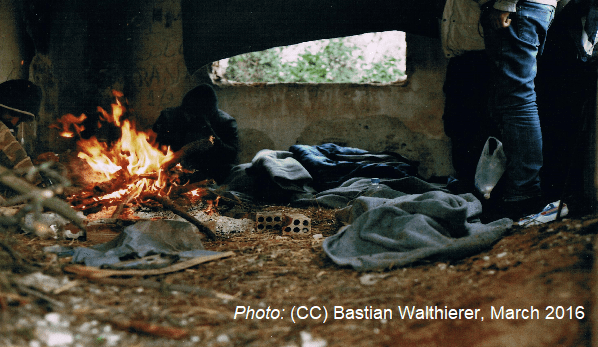Confronted with questions in the Croatian parliament regarding overwhelming evidence of violent pushbacks by police forces, the government denied that the officers in question were acting under orders and that the problem is systemic. Pointing to EU complicity and the normalisation of violence against people in need of protection, NGOs urge a stronger response at the European level. A freedom of information request by Centre for Peace Studies raises serious questions about the independency and efficiency of the Croatian border monitoring mechanism.
An eight-month investigation by reporters in seven countries has unearthed extensive video and forensic evidence of violent pushbacks by authorities in Greece, Romania and Croatia. The results of the investigation, led by Lighthouse Reports, have caused outrage from civil society across Europe. Romanian authorities deny any involvement in pushbacks despite evidence including footage of a masked man wearing a jacket inscribed with insignia of the Romanian Police chasing people back across the border with Serbia. The Romanian Ministry of Foreign Affairs has remained unresponsive to media requests for comments. In Croatia officials have confirmed to Der Spiegel that members of special police units hiding their identity with masks and unmarked uniforms have been involved in systematic violent pushbacks under Operation Koridor established in 2016 and co-financed by the EU. A police officer with a long history of participation in such operations confirmed to Libération that all officers are aware that they are illegal but carry them out on orders from the government and the Interior Ministry. According to investigative journalist Djurdjica Klancir, officers involved: “felt like the protectors of Croatia and the EU; they always had the feeling that the operation was been carried out with the blessing of the Croatian government and the EU”. Further Klancir explained that beatings, robberies, and mistreatment were a deliberate tactic to frighten people on the move attempting to reach the EU. On the other side of the border, Bosnian police officer described the “rape of certain people”, “torture” and said that he has “seen people beaten, injured, bloody, many times”. According to human rights organisations, there were more than 16,000 pushbacks at the Croatian-Bosnian border last year alone. When questioned in parliament, interior minister Davor Bozinovic denied that masked officers conducting violent pushbacks were receiving orders from his ministry. Prime minister Andrej Plenkovic stated “In Croatia, laws are respected, along with international obligations,” noting also: “Our state does not want to be connected at all with actions that go against our legal system”. After the suspension of three police officers identified in video evidence, president Zoran Milanović told media:”I believe it’s an isolated case because otherwise, that would be more seen and known. Police must not act like that and that’s obviously overstepping one’s authority”.
European Home Affairs Commissioner Ylva Johansson called reports of pushbacks “shocking” and “credible” and said the EU urged states to take the matter “very seriously”. Johansson confirmed after meetings with Croatia that she had assurances that national authorities would open an investigation. According to a Commission spokesperson, national authorities have the “responsibility to investigate any allegations” and “properly follow up on any wrongdoing”. The German government has “noted with great concern” documentation of abuse of refugees and migrants at Croatia’s border with Bosnia and the German Foreign Office said it “fully supported” an investigation by the European Commission. NGOs however point out EU inaction and complicity. Speaking of the “normalisation” of “extreme violence” against people seeking protection, ECRE Director, Catherine Woollard stated: “There’s an unwillingness of the EU to act, because the general strategy in Europe is based on prevention of arrivals of people seeking protection, regardless of the costs and the consequences,” Woollard further noted: “So there is either a lack of action, which means the states can continue to carry out these pushbacks with impunity or in the worst cases, support for the member states”. Amnesty International’s Balkans researcher, Jelena Sesar, stated that the European Commission takes a: “blind eye to the staggering violation of EU law, and even continues to finance police and border operations in some of these countries”.
The recent reports are the latest in mounting evidence of violent pushbacks by Croatian authorities. Following similar reports in November 2020 the European Ombudsman opened an inquiry into the Commission’s failure to ensure the establishment of an Independent Monitoring Mechanism as demanded by NGOs. After years of negotiations, Croatia finally agreed to establish a border monitoring mechanism in June 2021. However, a freedom of information request from ECRE member the Centre for Peace Studies has raised serious questions about its independency and efficiency deeming it “toothless”. Activists raise transparency issues regarding the establishment of the mechanism, saying: “The selection process and criteria are unknown. All organisations being vocal about pushbacks and helping to bring the issue to light over the past five years have been excluded from the process”. It has been reported that: “The mechanism will carry out maximum 20 monitoring sessions per year, out of which visits to areas outside official border crossings, where reports place the vast majority of violent pushbacks, will only be announced in advance”.
For further information:
- ECRE, Balkan Route: Hundreds Pushed Back Across the Region in August – Afghans Victims of Systematic Pushbacks, Evictions, Raids and Hostility in Croatia and BiH, September 2021
- ECRE, Balkan Route: Pushbacks, Violence, and Evictions Continue at High Pace as the Need for an Independent Border Mechanism Remains, June 2021
Photo: (CC) Bastian Walthierer, March 2016
This article appeared in the ECRE Weekly Bulletin. You can subscribe to the Weekly Bulletin here.

